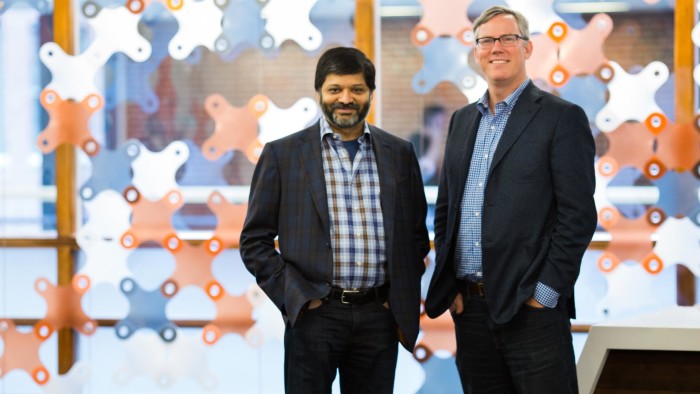The class project that hit the marketing spot

Simply sign up to the Business education myFT Digest -- delivered directly to your inbox.
If there were a handbook for MBA students on how to find your future co-founder at business school, Brian Halligan and Dharmesh Shah — the entrepreneurs who met at MIT Sloan and subsequently started HubSpot, the marketing software company — would make an excellent entry.
“A lot of people ‘diss’ MBA programmes but HubSpot wouldn’t exist if it weren’t for MIT Sloan,” says Mr Halligan.
After all, he says, most of HubSpot’s first employees, including its vice-presidents of sales, marketing and engineering and its first intern, were MIT Sloan graduates.
Edward Roberts, the founder and chair of the Center for MIT Entrepreneurship and one of their former professors, was the company’s first angel investor. Indeed, most of HubSpot’s early backers were classmates. “We are a house brand,” he says.
And a fast-growing one at that. Founded in 2006, HubSpot, which helps companies attract customers through social media and enables them to calculate the return on investment of their marketing initiatives, boasts 750 employees and 11,500 clients in more than 70 countries. It has market capitalisation of more than $1bn and reported third-quarter revenue of $30.4m, up 51 per cent from a year earlier.
“HubSpot has a bright future,” says Michael Cusamano, a professor at MIT Sloan who taught the company’s two founders and has watched HubSpot from its beginning. “They have the right leadership, a lot of customers, plenty of money and they’re growing quite fast.”
The two men’s paths to MIT were different but both had successful careers before business school.
Mr Shah, who was born in India, north of Mumbai, grew up in the US. It took him seven years to earn his degree in computer science at the University of Alabama at Birmingham, working full time to pay for school and support his family.
After college, he founded Pyramid Digital Solutions, an enterprise software company that sold apps to large financial services companies. He sold it 10 years later to SunGard Systems. With the proceeds he could have retired but decided instead to go to business school.
“I had always wanted to go to MIT,” he says. “The plan was not to do another start-up. My proverbial 80-hour weeks were over. I promised my wife that I was hanging up my entrepreneurial hat.”
Mr Halligan, meanwhile, grew up in suburban Boston. After graduating from the University of Vermont with a degree in electrical engineering, he got a sales job at Parametric Technology, the software company. There, aged 25, he built the company’s Asian business in Tokyo and later Hong Kong.
He returned to the US and worked at Groove Networks, the software company that was acquired by Microsoft. He then enrolled at MIT Sloan.
“Business school was always on my life list,” he says.
The two met each other at an MIT cocktail party for new students and after a few months in classes together they seemed to hit it off. They realised they were enthusiastic about similar themes: “We were passionate about small businesses and excited about the disruptive power of the internet,” says Mr Shah. “I realised: ‘We might actually do something together someday’.”
The two chose classes together, entered a business plan competition and spent time vetting each other as a potential co-founder.
“In retrospect it was pretty smart,” says Mr Shah. “If you are thinking about starting a company with someone, business school is a nice safe environment to get to know that person.”
The earliest version of HubSpot sprang from a class project at MIT. After they graduated, they rented an office at the Cambridge Innovation Center, employed some overseas developers to help write code and started to pitch to potential customers.
When Mr Halligan made those first sales calls, he could tell immediately that the concept of “inbound marketing” resonated with potential clients.
“Their marketing was broken,” he says. “Lightbulbs would be going off and customers were saying ‘yes’ to orders in a way that I’d never seen in my career.”
HubSpot makes a compelling case. At a time when people are increasingly using caller ID to screen calls and ad blocker software and spam protection to filter emails, companies must find new ways to reach customers. HubSpot’s platform provides website management, blogging software, search tools and social media management to help companies be discovered by customers.
“We taught them how to get found in Google, get found in social [media] and get found in blogs,” says Mr Halligan.
In October, HubSpot debuted on the New York Stock Exchange and raised $125m, which it will use to develop sales products and expand internationally.
“It was exciting for the investors and it was great to make our employees look smart in front of their families and put a little money in their pocket,” he says.
But the pair still have a lot of work to do. “We were back at work the next week cranking away,” adds Mr Halligan.
Comments